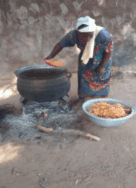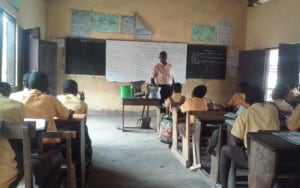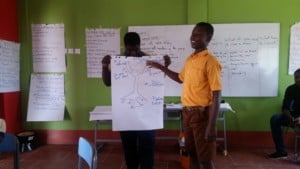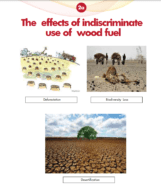Integrating Green Education into Ghana’s Basic Education Curriculum
November 23rd, 2022 | Stories
Wood fuels like firewood and charcoal make up a considerable amount of Ghana’s energy supply. In 2015, it was estimated that wood fuels accounted for 40% of the final energy demand, and close to 23 million Ghanians depended on firewood and charcoal for cooking.
 The use of wood fuels is harmful to human health, causes deforestation, and impacts the climate. Most school kitchens in Ghana use firewood or charcoal as their main source of cooking energy, often in traditional, inefficient stoves. The responsibility of collecting, processing, and transporting wood fuels often falls on women and children, meaning they suffer the greatest share of the health burdens, time losses, and physical impacts.
The use of wood fuels is harmful to human health, causes deforestation, and impacts the climate. Most school kitchens in Ghana use firewood or charcoal as their main source of cooking energy, often in traditional, inefficient stoves. The responsibility of collecting, processing, and transporting wood fuels often falls on women and children, meaning they suffer the greatest share of the health burdens, time losses, and physical impacts.
To avert the negative environmental and health effects of using wood fuels, World Education worked with local communities and the Ghanaian government through the INSPOCCE and I-SKIP projects to raise awareness of the impacts of wood fuels and promote the use of clean cooking methods.
From 2015 to 2018, we worked with the Ministry of Education through the National Council for Curriculum and Assessment (NaCCA) to integrate clean cooking, climate change, and green economy issues into Ghana’s basic education curriculum.

By equipping teachers to teach environmental issues through three existing subjects, integrated science, social studies, and technical vocational education and training (TVET), students better understood the impact of burning wood fuels and what mitigation actions communities can take. For example, while teaching health in integrated science, teachers integrate lessons on how burning brush and building up soot on indoor walls can lead to respiratory infections. They can then teach students how to burn brush safely and the importance of keeping the environment clean and using clean cooking.
In addition to developing the curriculum, we aimed to sensitize communities on clean energy and encourage clean cooking while promoting tree planting, waste management, and general green economy ideas. In particular, we worked to raise awareness among Ghanian youth, strengthen their leadership skills as peer educators in their communities, and provide opportunities for them to be proponents of change – starting from their own households.

As peer educators, students receive lessons on types of energy and how they impact the environment, and then discuss a set of questions. Manuals developed by World Education help facilitate these lessons, and show students how they can help their communities by spreading the word on clean cooking and wood fuel burning. Peer educators also learn about communication, self-esteem, gender roles, and more.

After piloting the new curriculum, training teachers, and engaging the community, we saw positive results. By the end of the project, 80% of students were aware of the negative environmental and health effects of using traditional cookstoves. The Government of Ghana became interested in expanding the curriculum and it was officially integrated into the Ghanian basic education curriculum across all schools for the first time in the 2021-2022 school year, reaching students up to senior high school. We are committed to continuing promotion of green education in Ghana. World Education Ghana’s Adwoa Sey recently presented in the West Africa LPG Expo on clean cooking and is the chairperson of the Ghana Alliance for Clean Cookstoves.
Given that globally, only 53% of national curricula mention climate change and only forty countries that are signatories to the Paris Agreement mention climate change education in their Nationally Determined Contributions plans for mitigating and adapting to climate change, we are committed to replicating our successes in Ghana in other countries where we work. Towards this goal, World Education recently joined the new global Greening Education Partnership, aimed at helping partner ministries of education ensure learners adopt behaviors vital for addressing the causes of the environmental crisis.
World Education fosters enduring partnerships across regions and sectors to advance education outcomes for all. We offer education systems strengthening, program design and implementation, applied research and evaluation, capacity development, and policy development services.